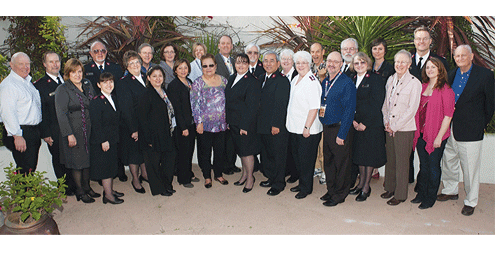
First ever territorial Social Services Councils examine and strategize seven critical topics.
Territorial Commander Commissioner James Knaggs commissioned the newly formed Western Territorial Social Service Response Team, which met in February for the first-ever Social Services Councils to discuss topics critical to the growth of the Army in the West. Major Lawrence Shiroma, territorial social services secretary, led the four-day conference on the Army’s caring ministries.
The response team split into small groups to strategize seven items that they identified as critical to the Army’s moving forward. At the final meeting of councils, a representative from each group presented a strategy including a timeline for results to the assembly, and Knaggs immediately responded to each proposal.
Topics under ongoing examination include: 1) How to create new social service corps and linkages; 2) Jobs for the working poor: and what works; 3) How to have Salvation Army homes for the homeless; 4) How to successfully pursue public and private funding; 5) How to publish Salvation Army research on poverty; 6) How to aid victims of human trafficking in your community; and 7) How to trace our lost soldiery.
In strategizing these subjects, participants kept in mind the threefold purpose of the Social Services Response Team, which are, in short, to be proactive in identifying and meeting the needs of the community, to strongly reaffirm The Salvation Army’s place as a major social services provider in the Western Territory, and to help shape the future of The Salvation Army in the West.
“Commissioner Knaggs’ presence and willingness to respond to the team strategies was an important part of the event,” said Marcus Stannard, contract, legal and property services director for the Hawaiian and Pacific Islands Division. “When the organization leader puts himself ‘on the line,’ that speaks of leadership.”
In closing, Knaggs thanked the team for its good work and its ministry, and declared his plan to bring them together often. “Let’s get the research projects going,” he said, “put the subjects together.
“We need to do a better job in responding to the needs of our times, on a macro and micro scale,” Knaggs said. “I want us to take not just a notch, but a quantum leap forward. I believe we will attract more funding and more resources to get the job done. God has always provided the resources that we need as we remain faithful and accountable. You are a very important part of who we are.”
Team member Diane Brandsma, executive director for White Shield Center, summed up the councils experience: “I left with a sense of hope. It is easy to lose hope and perspective and to get caught up in numbers and dollar signs versus the people we serve and the needs of our community.
“The Commissioner’s vision and willingness to support these amazing programs, and explore innovative ideas and creative funding streams gives me a bit of peace amidst the chaos,” Brandsma said.











